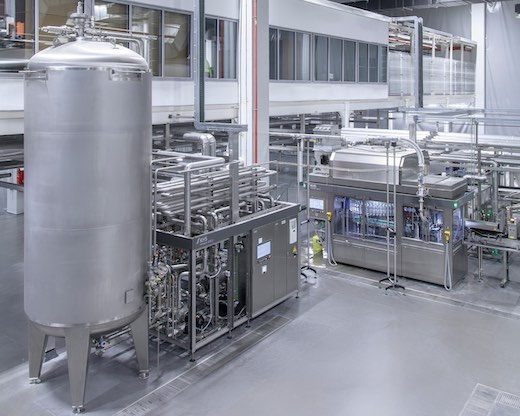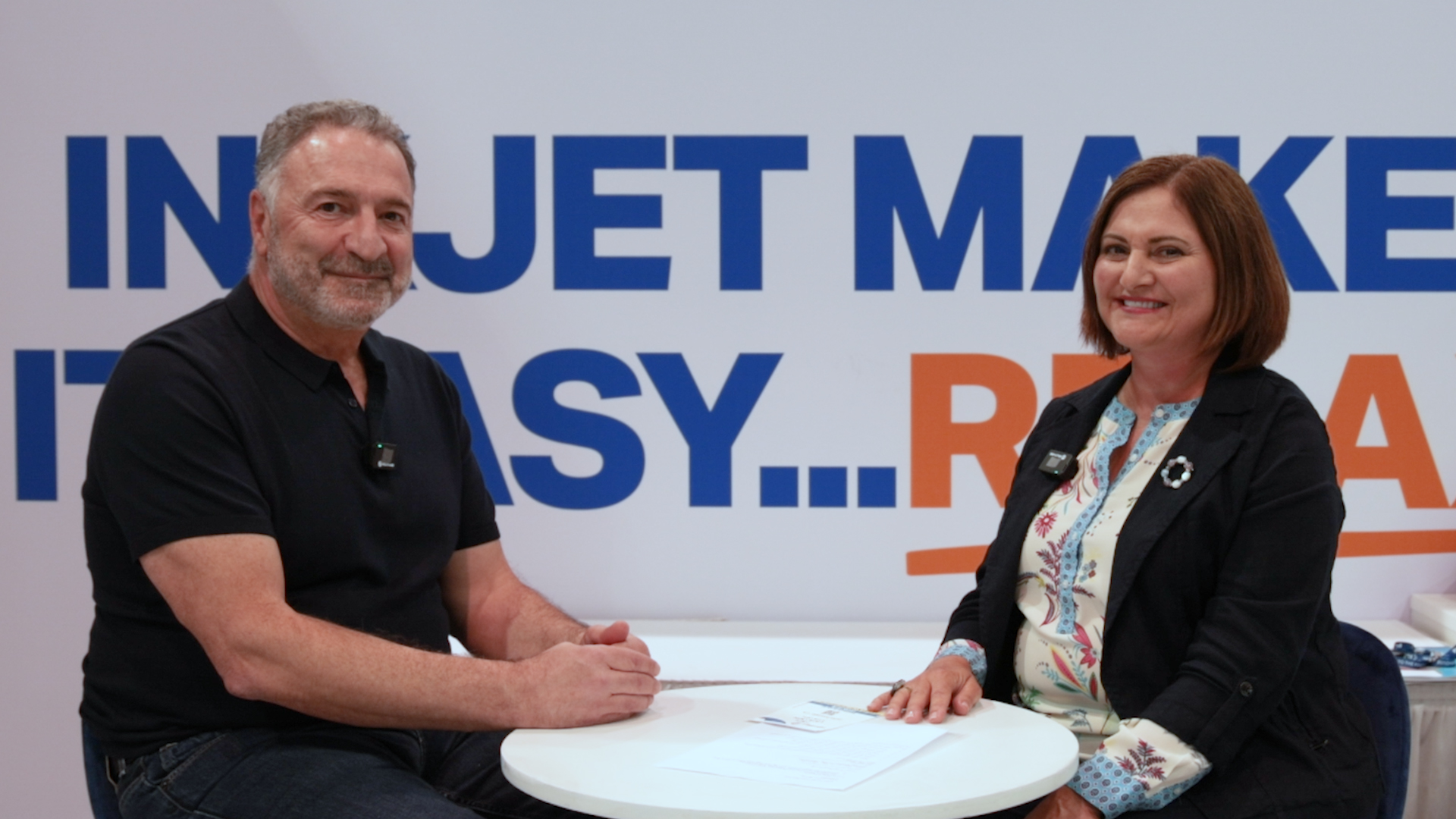With Technological Support From KHS, Georgian Mineral Water Brand Borjomi Enters the 21st Century
Press release from the issuing company

Georgian mineral water brand of international renown Borjomi successfully marries rich tradition with future technology. It’s greatly supported in this endeavor by KHS – with the delivery and installation of three filling and packaging lines and much more.
To cite the legend of Borjomi, one of the most famous mineral waters in the world first demonstrated its rejuvenating powers to a wounded deer in the Caucasian pine forests of Georgia. A hunter observing the animal’s wondrous recovery then tried the water himself; feeling revived and invigorated, he rushed home to tell of his wondrous discovery. Archaeological finds show that the mineral spring has been used for around a thousand years, its story of success really only taking off in the middle of the 19th century. At a time when spa tourism was flourishing all over Europe, the little town of Borjomi developed into an opulent spa resort where Russian aristocrats and well-heeled Persians and Azerbaijanis had splendid palaces and villas erected. Famous guests such as Tchaikovsky, Tolstoy and Stalin sought relaxation and recreation in the town, as did many families with children up into the 1980s and 1990s.
Borjomi’s curative water has been filled into glass bottles here since 1890 – in not immodest quantities of ten to twelve million bottles per annum even in the early days. In 1969 a new bottling shop replaced the historic facility that now serves as a museum. In the 1980s the modern setup notched up annual sales of around 400 million bottles. The beverage named after the city on the Kura River is synonymous with mineral water throughout the entire region, highly popular for its extremely mineral and slightly salty taste. Naturally fortified with carbon dioxide from a spring that bubbles out of the rock at a constant temperature of between 37 and 41°C, over 60 different minerals and other natural ingredients make this water unique. Closely monitored by geologists and physicists for more than 170 years, well over 100 studies and analyses confirm its constantly high quality and unchanged physical and chemical properties: thanks to the potassium, calcium, magnesium, sodium, chlorine, hydrocarbons and a high level of alkalinity it contains, the water scores by “renewing, revitalizing and rejuvenating body, mind and soul”, as the company website claims.
Borjomi also holds emotional appeal in several different respects. Better known than any other home brand in Georgia, over the decades it has developed to not only become the unrivaled market leader but also an icon that endows a sense of identity. Beyond the national borders this water from the Caucasus acts as a figurehead, constituting a large proportion of the country’s entire export volume. Finally, the name “Borjomi” is inextricably linked to the proverbial hospitality that’s always shown here in this land between the mountains and the coast of the Black Sea. “In everything we do we want to celebrate our own history and the rich cultural heritage of Georgia,” states Ivane Matchavariani, CEO of IDS Borjomi Georgia. “We also want to be a beacon for the future of our country. For this, we need to speak the language of the next generation.”
Common history
On the company’s journey into the future, German machine and systems manufacturer KHS has been a reliable partner for many years. A first filtering system was procured over 60 years ago from predecessor company Seitz in Bad Kreuznach and from 2004 to 2006 KHS was largely responsible for the supply, installation and commissioning of a PET line and the packaging and palletizing section of a glass line. Together, the two companies not only look back but also and above all forward: as its technology partner the Dortmund systems supplier supports IDS Borjomi Georgia, to give the beverage producer its full name, on its journey into the future. In 2020 construction started on a further up-to-the-minute, over €40-million facility in the historial spa town of Borjomi. Kitted out with hightech from Germany in the main, this is setting new standards for the industry and the region and pumping new impetus into the country’s economy. When finished, the new bottling plant covering 25,000 square meters will provide 20% more jobs and enable capacity to be doubled in the medium term. This is to allow the growing demand to be met on the one hand and the portfolio to be expanded as and when required on the other. Ecology is especially important here: for instance, the new machines have been optimized for efficient use of energy and water and a cutting-edge sewage plant filters wastewater. Much of the work has already been finished; the logistics centers and railroad connections are expected to be completed by the end of 2024.
Aside from supplying large proportions of the equipment for the process technology and filling and packaging systems, KHS has taken on the role of consultant and general contractor, on whose experience the beverage bottler is happy to rely. “We have complete trust in KHS’ technological expertise when it comes to the filling of mineral water and carbonated soft drinks,” says Gia Shatirishvili, industrial development director for IDS Borjomi Georgia. “Together we’ve drawn up a conceptual master plan that consists of the technical preparation, calculation of production and supply capacities and the perspective layout of the new factory.” Specifically, KHS is helping to dimension the water treatment area, manage supply to the lines with media such as steam, air, CO2 and cooling and plan the supply networks and CIP concepts. The engineers from Dortmund are also involved in the design of the production shop. Here, all of the opportunities provided by 3D line design are being fully exploited.
Hightech for PET and cans
Two turnkey KHS lines have already been installed and commissioned: an InnoPET BloFill stretch blow molder/filler block is being used to fill PET bottles holding between 0.5 and 1.25 liters at a rate of up to 30,000 containers per hour. KHS’ Bottles & Shapes experts provided direct assistance in dialog with the customer’s marketing personnel when it came to redesigning the plastic bottles. They supported the optimization of the iconic Borjomi bottle in many different ways, namely by enabling the legendary stag to be embossed on the containers. The block itself features an Innofill DRV filler that’s also state of the art. Further highlights in the line’s wet section include a Paramix C blender and an Innoket Neo Flex 90 labeler – one of the first with a swivel arm HMI. With the help of four cameras the three cold glue paper labels on the body, shoulder and back of each bottle are aligned with the brand logo exactly as specified by the marketing department. The dry section ends with an Innopack Kisters SP Advanced shrink packer with a handle applicator and the flexible palletizing technology of the Innopal PB N combined with an Innopal RG grouping system.
Up to 36,000 beverage cans per hour are filled on the second line. After blending on the Paramix C, the cans are fed to the compact Innofill Can C filler before traveling on to a seamer from Swiss engineering company Ferrum, a KHS Innopro KZE flash pasteurizer and a tunnel pasteurizer. As the beverages are exported to 40 countries, calling for a large number of language variants, the 330-milliliter sleek cans printed with the brand motif on the front are dressed with the appropriate pressure-sensitive label on the back. In the dry section an Innopack Kisters TSP for trays and shrink film is used for packing. An Innopal LD Z depalletizer transports the empty cans to the packaging line, with an Innopal PB N again used to palletize the packaged products.
Customized process technology
Regarding the process technology, KHS has also contributed a fully customized syrup room that can serve not just the two new lines already installed but also two more in the future and boasts several special features. “The complex water concept is controlled from here by the process control system,” explains Ilya Kukushkin, technical sales manager for key accounts at KHS. “It enables recipes to be managed, for example, and is especially operator friendly, particularly in combination with the fully automatic valve manifold. Besides machines for the manufacture, treatment and storage of sugar syrup, the syrup room includes funnels and suction lances for the dispatch and processing of liquid and solid small components and a barrel emptying station for viscous concentrates – all directly connected to the six mixing tanks that hold 10.5 or 22 cubic meters respectively. All kinds of basic substances can be produced in these; the customer has full flexibility here.”
Three CIP stations have also been integrated: one for the two lines, one for the syrup room and one for the water treatment unit including all water pipelines. “The piping includes the four-kilometer-long link to the dosing station for disinfectants at the old plant. This is the longest cleaned pipe I’ve ever heard of,” smiles Kukushkin.
In addition, in the middle of the year – namely in the summer of 2023 – the order for a further PET line went to KHS: in the future, this system is to be able to fill up to 36,000 1.5-liter bottles per hour – a brand new container size for the bottler. “What we particularly appreciate about KHS are its end-to-end systems that effect an excellent balance between high line efficiency and a small machine footprint,” Shatirishvili emphasizes. “With its powerful technology, high degree of flexibility and the great commitment shown by its employees, for us this company is a partner we’d like to continue to work with in the long term.”
Premium brand with a future
After all, Borjomi has a lot more planned – and not just with respect to its technical equipment. Things are also moving with the mineral water brand. Borjomi’s corporate identity was thus fully revamped back in 2019. Since then, the brand image has emphasized the company’s link to its homeland even more strongly than before, giving it a highly modern twist. In 2021 the brand content was then repositioned as “Live Water, Live Legend”.
“We’ve concentrated on how we bottle and label our products for 133 years,” explains Shatirishvili. “The bottle and packaging design therefore play a decisive role for our entire product portfolio – and even more so for our historic premium brand Borjomi.”
The beverages themselves have also had something of a makeover. The company’s soda pop range has now been joined by flavored water in cherry-and-pomegranate, lemon-and-ginger, lime-and-coriander and wild-strawberry-and-herb flavors – all supplied in sleek aluminum cans that in this region at least constitute a fairly exotic form of packaging. “The labeling especially makes our latest canning line a real highlight and the first system of its kind in the entire Caucasus,” Kukushkin proudly claims. “For Borjomi these products that go beyond water are a totally new business, one where the customer is happy to have us advise and help them. The focus here is on flexibility and product safety in the production, filling and pasteurization of these beverages.”
Since 2016 the market share of still versus carbonated water has risen considerably to about 60% – and there seems to be no end to this upwards trend. Owing to growing doubts about the general quality of drinking water and an increasing awareness for health and wellness, Borjomi expects that more and more consumers will opt for bottled water as a safe alternative. “We intend to position Borjomi in this segment as a strong and competitive player on the international market – and we’re heavily investing in our brands to this end,” Matchavariani concludes, pleased that he and his team will be able to fully rely on their partner KHS in the future, too.
- Questions to ask about inkjet for corrugated packaging
- Can Chinese OEMs challenge Western manufacturers?
- The #1 Question When Selling Inkjet
- Integrator perspective on Konica Minolta printheads
- Surfing the Waves of Inkjet
- Kyocera Nixka talks inkjet integration trends
- B2B Customer Tours
- Keeping Inkjet Tickled Pink
© 2024 WhatTheyThink. All Rights Reserved.















Discussion
Only verified members can comment.